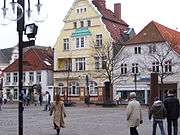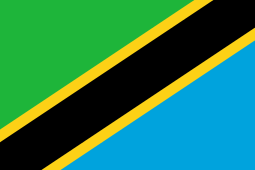Eckernförde
| Eckernförde | ||
|---|---|---|
|
Port of Eckernförde in mid-October 2005 | ||
| ||
 Eckernförde | ||
Location of Eckernförde within Rendsburg-Eckernförde district  | ||
| Coordinates: 54°28′27″N 9°50′16″E / 54.47417°N 9.83778°ECoordinates: 54°28′27″N 9°50′16″E / 54.47417°N 9.83778°E | ||
| Country | Germany | |
| State | Schleswig-Holstein | |
| District | Rendsburg-Eckernförde | |
| Government | ||
| • Mayor | Jörg Sibbel | |
| Area | ||
| • Total | 17.97 km2 (6.94 sq mi) | |
| Elevation | 0 - 42 m (−138 ft) | |
| Population (2015-12-31)[1] | ||
| • Total | 21,859 | |
| • Density | 1,200/km2 (3,200/sq mi) | |
| Time zone | CET/CEST (UTC+1/+2) | |
| Postal codes | 24340 | |
| Dialling codes | 04351 | |
| Vehicle registration | ECK | |
| Website | www.eckernfoerde.de | |

Eckernförde (Danish: Egernførde, sometimes also Egernfjord, Low German: Eckernför, sometimes also Eckernföör) is a German town in Schleswig-Holstein, Kreis Rendsburg-Eckernförde, on the coast of the Baltic Sea approximately 30 km northwest of Kiel. The population is about 23,000. Eckernförde is a popular tourist destination in northern Germany.
Name
The name of Eckernförde is of mixed origin, but derived from the name of a Danish castle formerly located near the current town, which is also reflected in the name of the town district of Borby. This fortification is listed in the 13th century Liber Census Daniæ as Ykærnæburgh.[2] In 1441, the town used an official seal listing its name as Eherneborgh.[3] The first syllable corresponds to the modern Danish word "egern" meaning squirrel while "-förde" is Low German meaning fjord.[2] The -förde ending is documented in Latinized form on two official seals used by the town in the 1602 and 1624.[3] The etymology of the town's name is reflected in the presence of a squirrel in the town's coat of arms, a feature first documented by the 1441 seal.
History

- In 1197 Eckernförde was mentioned for the first time.
- Eckernförde was mentioned in the year 1302 for the first time free of doubts as a city, but in 1288 the inhabitants were already called oppidani (city citizen).
- During the First War of Schleswig two Danish ships, the Christian VIII and the frigate Gefion tried to land in Eckernförde in April 1849. They were cannonaded from the shore. The Christian VIII exploded, while the Gefion surrendered and was captured. Theodor Preusse, the commander in chief of the southern troops, died while rescuing Danish troops from the Christian VIII.
- The 13 November 1872 Baltic Sea flood hit the coast of the Baltic Sea from Denmark to Pomerania. Of all the German coastal settlements, Eckernförde was most heavily damaged due to its location on Eckernförde Bay which was wide open to the north-east. The entire town was flooded, 78 houses were destroyed, 138 damaged and 112 families became homeless.
- The Count Saint-Germain was buried in Eckernförde near the St. Nicolai Church. His grave was destroyed by the 1872 storm surge.
- In 1934 the seaside resort Borby was incorporated.
- After the Second World War a United Nations displaced persons camp for Estonians was located near Eckernförde,[4] where a section of the Hohenstein mansion was converted into a maternity ward.[5]
Mayors
- 1906–1914: Karl Heldmann (1872-1914)
- 1920–1921: Willers Jessen (temporary)
- 1921–1926: Curt Pönitzsch
- July-September 1926: Wilhelm Kuhr (temporary)[6]
- 1926–1931: Walther Heinn (temporary)
- 1931–1933: Wilhelm Sievers, (1896-1966), NSDAP
- 1933–1938: Helmut Lemke, (1907-1990), NSDAP
- 1938–1943: Friedrich Böhm, NSDAP (time of office till 1945)
- 1943–1945: Heinz Loewer, NSDAP (temporary)
- since June 1945: Hans Ohm (temporary)
- since August 1945 Ewald Wendenburg (temporary)
- since April 1946: Heinrich Schumacher KPD
- since September 1946: Daniel Hinrichsen, CDU
- April 1950–September 1952: Ewald Wendenburg, CDU
- 1952–1966 Werner Schmidt, (1911-1990), independent, then FDP
- 1966–1969: Hans Wiedemann, independent
- 1969–1987: Kurt Schulz, SPD
- 1987–1998: Klaus Buß, (born 1942), SPD
- 1998–1999: Ingrid Ehlers, SPD (temporary)
- 1999–2006: Susanne Jeske-Paasch, (born 1958), SPD
- since 2007: Jörg Sibbel, (born 1965), independent
Economy
In the early 20th century, Eckernförde was known for its harbour, fishing, trade in agricultural products, and manufacture of salt and iron goods.[7]
All German Navy submarines are stationed in Eckernförde. It is the home of BEHN, an alcoholic beverage family company, founded in 1792. The headquarters of SIG Sauer are also located there.
Education
Schools in the city include the Richard-Vosgerau-Schule. The Richard Vosgerau School is a public elementary school in Eckernförde. The address is 26 Bergstraße, 24340 Eckernförde. The current head of the school is Mrs. Koepke. The school building consists of a white main house and a small outbuilding. Also to find are a football field and a sports hall. In the schoolyard, the school children enjoy various activities, ranging from slides to climbing.
Transport
The Kiel–Flensburg railway runs through the town with trains stopping at Eckernförde station, situated to the west of the town centre. The town's main bus station, central omnibus station (German: ZOB), is directly connected to the train station. The operating company of the railway network is Deutsche Bahn. Eckernförde has 4 bus routes for urban connections operated by single-deck buses. Eckernförde has no trams or trolley-buses. For transportation, the statewide Schleswig-Holstein-fare applies. At the bus station is also a taxi stand located. In Eckernförde are two bike rental outlets, one is located near the beach and one is in the pedestrian area.
Next international Airport is Hamburg Airport.
International relations
Eckernförde is twinned with:
-
 Macclesfield, England, United Kingdom (since 1953)
Macclesfield, England, United Kingdom (since 1953) -
 Hässleholm, Scania, Sweden (since 1958)
Hässleholm, Scania, Sweden (since 1958) -
 Tanga, Tanzania (since 1963)
Tanga, Tanzania (since 1963) -
 Nakskov, Region Sjælland, Denmark (since 1969)
Nakskov, Region Sjælland, Denmark (since 1969) -
 Brzeg, Opole Voivodeship, Poland (since 1989)
Brzeg, Opole Voivodeship, Poland (since 1989) -
 Bützow, Mecklenburg-Western Pomerania, Germany (since 1990)
Bützow, Mecklenburg-Western Pomerania, Germany (since 1990)
Notable residents

- Walter von Bülow-Bothkamp (1894–1918), a fighter pilot in World War I, winner of Pour le Mérite
- Georg Friedrich Clausen (1856–1940), German-American architect
- Lone Fischer (born 1988), handball player
- Ruth Halbsguth (1916–2003), German swimmer, silver medal at the 1936 Olympics
- Horst-Dieter Kolletschke (born 1952), former rear admiral of the Bundeswehr
- Christian Otte (1674–1747), wholesaler, shipowner, founder
- Friedrich Rathgen (1862–1942), chemist
- Maria Reese (born 1942), painter and graphic artist
- Grietje Staffelt (born 1975), politician (Alliance '90 / The Greens), former member of the German Bundestag
- Lorenz von Stein (1815–1890), constitutional lawyer and economist
- Karl Wilhelm Valentiner (1845–1931), astronomer
References
- ↑ "Statistikamt Nord – Bevölkerung der Gemeinden in Schleswig-Holstein 4. Quartal 2015] (XLS-file)". Statistisches Amt für Hamburg und Schleswig-Holstein (in German).
- 1 2 Politikens Nudansk Ordbog, 1994 edition, entry "Eckernförde"
- 1 2 Poul Bredo Grandjean (1953), Slesvigske Købstæders og Herreders Segl indtil 1660, J.H. Schultz Forlag, p. 13-14.
- ↑ Elle Andra-Warner (nee Jürivee), Red Lake Immigration story (Accessed: 26 June 2013)
- ↑ Andra-Warner, Elle But When Do You Know You Are Canadian? (Accessed: 26 June 2013)
- ↑ Stefan Deiters, Turbulenzen im Rathaus in den Kieler Nachrichten, Ausgabe Eckernförder Nachrichten vom 20. September 2014
- ↑ Chisholm, Hugh (ed) (1911)
External links
| Wikimedia Commons has media related to Eckernförde. |
- Official website (in German)
- City map (in German)
- Official tourist information (in German)
- Eckernförder Zeitung (local newspaper (in German)
-
 Chisholm, Hugh, ed. (1911). "Eckernförde". Encyclopædia Britannica (11th ed.). Cambridge University Press.
Chisholm, Hugh, ed. (1911). "Eckernförde". Encyclopædia Britannica (11th ed.). Cambridge University Press. - Fare- and route planner (in English)
- Petras mobile bike rental
- Bike rental Eckernfoerde

